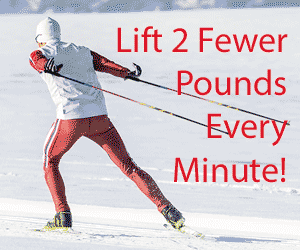
Q&A: Worlds Silver Medalist Kikkan Randall
Wed, Feb 25, 2009 - By US Ski Team
The U.S. Ski Team's Kikkan Randall (Anchorage) wrote a page in the history books of cross country skiing Tuesday as the first American woman to win a medal at the FIS Nordic Ski World Championships. Her silver is the highest result for any American cross country athlete, male or female, to be attained at the Worlds level.
Following her historic feat, Randall took the time to field questions from the media on what it took to get to where she is.
Audio Feed
What are your emotions after your historic silver medal?
It's hard to describe and it's only settling in. I had set my goals and had been going step by step. Today was an amazing day come true. Last spring I wrote down in my logbook that one of my goals was to win a medal at the World Championships.
What is the importance of the goal?
This season it's been important to have the goal out there. I didn't start out as well as I had hoped but knowing that the goal was to get a medal here it kept my focus and attention. Going into today it was kind of fun knowing the challenge and opportunity was there.
Talk through your day, including your heats leading up to the final.
It was a great day all around. I had a little nervousness going into the qualifications. But once I was on course I felt smooth and strong. I decided my strategy was to get out front, control the pace and stay out of trouble. I was happy to see I had the power to get out front. In the final I missed a pole plant off the start, but kept composed, and was able to keep the lead over the top. I had great skis today. I had to counter each challenge. On the last uphill I was still leading. I tried to give it what I had. I was neck and neck with Arianna [Follis, gold medalist]. The snow here was packing down and was uneven so it was tricky to keep a balance. So we really had a good race all the way to the finish.
It was a great race – kind of like Steve Prefontaine.
How long did it take you to get back in shape after the blood cot? And can you assess the risks?
At the end of the season I was riding high with my World Cup win and great results at the Canadian nationals. I was feeling strong and invincible. But I started to feel some symptoms coming on. All of a sudden I was diagnosed with a blood clot and it was a complete 180. All of a sudden my life could be threatened at any moment. Fifty percent of people with a clot the size of mine - it can go to the lungs and be fatal. I didn't know what the future would hold. It was a really scary time. Thankfully I was able to see the right doctors. We thought we had it but it came back a second time. The second time around the prognosis was better but the future was uncertain. It was a lot of uncertainty but my motivation was really strong. I had a chance to look at my life and what was important to me, and skiing was important. A week or two after getting out of the hospital a second time, I was able to ski. It was a busy time getting married, moving into a new house and training by the end of June. I was on blood thinners for six months but it didn't have much impact on training. I think that effected my racing season at the start.
My coach Erik Flora encouraged me to be patient and focus on World Championships.
Now I feel great and strong.
You compared your Rybinsk win to Roger Bannister breaking the four-minute mile. What is this?
Having already used that analogy it's hard to find a new one. It's another step further. The win in Rybinsk showed me it was possible but I also spent a few other races not on the podium. It's so difficult to compete at this level. In my heart I knew I could do it. But it's a long season. I just focused on what I needed to do today. Crossing the finish line I realized what it really meant.
I looked back at what it meant when [Canada's] Becky Scott won her first medal and how it motivated other skiers.
Can you reflect back on the people you're thinking about who helped build this effort?
The list of people who have helped me is long, for sure. It's definitely been running through my head today at hyperspeed. My aunt Betsy [Haines] and uncle Chris [Haines, both Olympians] were good role models growing up. Knowing that they went to the Olympics let me know it was possible. My parents always encouraged me, but never forced me. I had some great coaches along the way especially a high school track coach that helped me get on a year-long training track. And ski coaches like Frode Lillefjell and John Galanes.
My current coach Erik Flora helped to push me a bit and that's where the performance came.
The U.S. Ski Team coaches have been great for me since I showed up for World Junior Championships in 2000.
We have an amazing staff here and knowing what it represents for our whole team is great. My husband, Jeff, was here today and it was special to share it with him.
I have to thank my community in Anchorage, who sponsored me to get me to this level, and [Olympian] Nina Kemppell, who showed me the ropes. It's just an amazing group of people.
It was an individual medal today but shared with a lot of people.
Explain how it's an individual sport but you work together as a team.
It's a tough sport at this level. But when you have a teammate who does well, it motivates you. We all train together and come from similar backgrounds. We all get fired up. And with our nordic combined and jumping teams, and with Kris Freeman's success [fourth in 15K classic] – Liz [Stephen, 15th in pursuit including seventh in skate leg] skied an amazing race – everyone supports each other and pushes each other.
What does your finish today say to American public about what is possible in Vancouver?
Cross country has been a background sport for a couple decades. Americans like to see Americans win. I hope my medal today will get people to support the Team going into the Olympics. I hope that the young skiers who are just noticing the sport today can see that being a cross country skier is a cool thing to do. I love raising awareness for the sport. Every time they show more coverage in the Olympics it's good
Did they determine what caused the blood clot?
I met with a lot of doctors and it seems like it was a perfect storm. Any of a number of factors might have caused it. Luckily, because we have been able to identify those things, I'm confident we can move forward and not have trouble.
Your best results have been in skating? Can you translate your success to classical?
I've definitely had my best results in skate but I've been working really hard on my classic. I've been making small steps forward and I’m going into give it my best try and a lot can happen in a year.
Laura and I teamed up in the test event in Liberec and we were just a tenth of a second shy of making the finals. That gives us a lot of motivation for tomorrow. If we put it together anything can happen.
Is there anything that's happened in the U.S skiing community that has made a difference? How can USA stay at this level?
I think you have to look back beyond a few years. When I got into the sport someone told me it would take 10 years. About 10 years ago I started to formulate my goals and it's really been 10 years in the making. Thankfully the U.S. Ski Team has provided the opportunities over those 10 years to make it happen. Certainly sprint has helped but we're getting results in longer distance. But the confidence in the organization has helped. We just need that continued belief to give our athletes.
